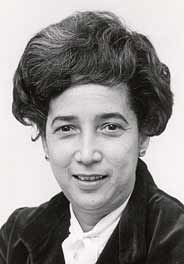|
 |
|
Esta página no está disponible en español. THE NEW YORK TIMESAntonia Pantoja, 80, Champion Of Bilingualism, DiesBy STUART LAVIETES
MAY 28, 2002
Antonia Pantoja, Puerto Rican activist, in 1968. ------------------------ Antonia Pantoja, an advocate for New Yorkers of Puerto Rican origin whose educational organization Aspira won a landmark lawsuit in the 70's that brought bilingual education to New York City public schools, died on Friday at Cabrini Hospice in Manhattan. She was 80. The cause was cancer, said her partner, Dr. Wilhelmina Perry. Dr. Pantoja, who received the Presidential Medal of Freedom from President Bill Clinton in 1996 for her efforts to provide educational and economic opportunities for Puerto Ricans, was born in poverty in San Juan, P.R., in 1922. Wealthy neighbors helped her attend the University of Puerto Rico, where she earned a teaching certificate in 1942. She taught in a rural school for two years, then, as a member of the first wave of impoverished emigrants from the island, she moved to New York City. At first finding wartime factory work as a welder, she won a scholarship to Hunter College, graduating with a bachelor's in sociology in 1952. She earned a master's degree from Columbia University's New York School of Social Work in 1954. Upon graduation, Dr. Pantoja focused her attention on the grinding poverty of Puerto Ricans in New York. At the time, half the Puerto Rican families lived below the poverty line; 70 percent of those who were employed worked in the lowest-paying jobs; 50 percent of those above the age of 25 had less than an eighth-grade education; and 40 percent lived in substandard housing. To begin addressing these problems, Dr. Pantoja founded the Puerto Rican Forum in 1957 to serve as an incubator for organizations and programs promoting economic self-sufficiency. The nonprofit organization is now known as the National Puerto Rican Forum. Dr. Pantoja directed most of her energies, however, to improving the performance in New York schools of Puerto Rican children, children of Spanish speakers who were taught only in English. By 1961, two out of three eighth graders had fallen more than three years behind in reading; by 1963, when there were 179,000 Puerto Rican public school students, only 331 received high school academic diplomas, and only 28 went on to college. In response, in 1961, Dr. Pantoja established Aspira, a nonprofit organization encouraging educational attainment, self-esteem, cultural awareness and leadership development. Operating through clubs in city schools, Aspira used rituals and symbols to appeal to students tempted by gang culture. It had a solemn induction ceremony, based on a Taino Indian ritual, in which "aspirantes" held candles and pledged to pursue educational excellence and to dedicate their success to their community. Its symbol was the pitirre, a small tropical bird known for its agility and speed. The group taught the "Aspira process" of awareness, analysis and action. Aspira now has offices in six states and Puerto Rico, and provides approximately 50,000 Latino students with career and college counseling, financial aid and other assistance. The program's graduates include Fernando Ferrer, the former Bronx borough president and 2001 mayoral candidate, and Anthony D. Romero, executive director of the American Civil Liberties Union. As politics changed in the United States, especially with President Lyndon B. Johnson's War on Poverty, Dr. Pantoja shifted her emphasis from self-help programs to reform of the educational system. In 1964, she helped draw up a request by the Puerto Rican Forum for $12.5 million from the city's antipoverty council to establish bilingual prekindergarten classes, after-school programs for struggling students, parental guidance and adult education courses, and other programs. In 1967, she served on a committee, convened by Mayor John V. Lindsay, that recommended the decentralization of the school system. That summer, after the riots that occurred in many American cities, she attended the New York constitutional convention in Albany, where she pressed for the state to assume constitutional responsibility for free higher education, adult education and "compensatory education" for the disadvantaged. In 1972, frustrated by what Dr. Pantoja saw as the continuing failure of city schools to educate Puerto Rican students — who still had a graduation rate of only 30 percent — Aspira filed a civil rights suit in federal court demanding that New York City provide classroom instruction in Spanish for struggling students. The suit resulted in a 1974 ruling ordering the city to establish bilingual classes and English as a second language classes for Latino students whose English skills were in the lowest fifth. Dr. Pantoja was also active in higher education. In 1970, she established the Universidad Boricua and the Puerto Rican Research and Resource Center in Washington, becoming its chancellor in 1973, the same year that she earned a Ph.D. from Union Graduate School in Ohio. She joined the faculty of San Diego State University's School of Social Work in 1978, and later founded the Graduate School for Community Development. After 1984, Dr. Pantoja devoted much of her time to work in Puerto Rico, establishing Producir, an organization that provides economic assistance to small businesses in poor rural areas, and Provivienda, which works to develop housing. She is survived by her partner, Dr. Perry; her brother, Esteban Lopez; and her sister, Haydee Lopez. Her autobiography, "Memoir of a Visionary," is being published this month by Arte Público Press. She was also working on a history of Aspira.
|

 ------------------------
------------------------